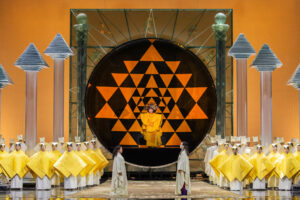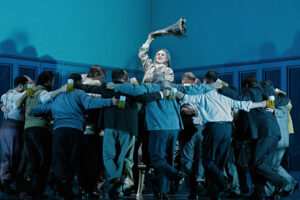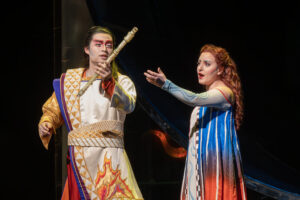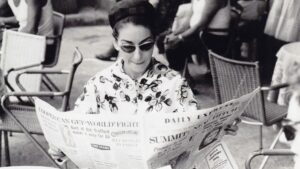

Brigitte Reiffenstuel’s eye-catching costumes combine bright red equestrian habits with the glamorous housewife feel of “I Love Lucy.” Paul Steinberg’s sets, beautifully lit by Carsen and Peter Van Praet, feature oak paneling with hunting motifs, a knowing nod to the play’s final prank, where Falstaff is instructed to appear wearing stag horns under Herne’s oak tree. In that magnificent, magical scene in Windsor Forest, signaled by mysterious horns, the back wall opens to reveal a starry black sky in a dreamlike space, with huge shadows both mysterious and comic.
Towering over the rest of the cast, Ambrogio Maestri’s Falstaff is no buffoon, no dirty lowlife, but the lazy moocher of Shakespeare’s Henry IV plays, which librettist Boito scoured for backstory. An entitled aristocrat disinterested in honor while rigorously living by his own code, even though it involves seduction and embezzlement, in the end Falstaff is content to have served as the butt of everyone’s jokes, declaring that it’s his own spirit of inventiveness and play that fuels everyone around him. With his handsome voice and superb diction, Maestri is a masterful singing actor with a delightfully commanding presence, whether prancing through “Va, vecchio John” as a music-hall number or fleetly dispatching Falstaff’s nostalgic “Quand’ero paggio” while carving a turkey.
In fact it’s Master Ford, a sleazy and rigid misogynist attempting to marry off his only daughter carelessly, who is the more despicable character. Franco Vassallo’s fine-textured baritone sounded constricted and small-scale, especially in Ford’s great jealousy monologue “E sogno…o verità,” but in disguise as “Fontana,” played here as a rich Texan in a gold suit, Vassallo was amusing.
Realizing they’ve received identical love letters from Sir John, Alice Ford and Meg Page plan the prank that results in Falstaff’s dumping in a muddy ditch after hiding in a laundry basket. As Alice Ford, Angela Meade proved herself a fine comedian, her sturdy, dark-hued soprano shaping Verdi’s lines with precision and luxuriant beauty, while Jennifer Johnson Cano brought savvy and suave musicality to the role of Meg.
As Mistress Quickly, Stephanie Blythe was in superb voice, playing the sidekick and co-conspirator with hilariously offhand aplomb and greeting Falstaff with roaring “Reverenzas” as she bursts into his men’s club entirely unaware of the offended gentlemen who eventually depart in a huff. Facing each other in overstuffed armchairs, Blythe and Maestri exuded a confidence that made one wish for more projects to team up these two comic masters.
Into the mix come young Nannetta Ford and her boyfriend Fenton, stealing kisses in micro-duets purposefully fashioned by Boito and Verdi to avoid a large-scale love scene. Paolo Fanale’s Fenton sounded one size too small for the Met, but Lisette Oropesa played Nannetta as an adorable young teenybopper, comfortable at home in pedal pushers, while poised and pert in public, and spinning sustained high notes with gossamer beauty.
In Met debuts, Carlo Bosi delivered a well-projected Dr. Caius and Christian Van Horn a resonant, lanky Pistola. As Bardolfo, Keith Jameson looked hilariously tiny next to the commanding Maestri, and showed plenty of comic appeal.
Allowing the orchestra to play out without covering the singers, while savoring then letting go of each detail in Verdi’s scurrying, lyrical, kaleidoscopic score, Levine brings a reassuring confidence that’s been in short supply this fall at the Met. Falstaff’s final fugue paints the world as a joke, everyone “gabbati” or duped, and Levine led the moment less boisterously than usual, with more subtlety and thought, while Carsen’s cast pointed to the audience and to each other knowingly.
The opening night performance was dedicated to the beloved American soprano-turned-mezzo Regina Resnik (1922-2013), who had sung both Alice Ford and Mistress Quickly during her long association with the Met.
Photo: Ken Howard/Metropolitan Opera

























Comments